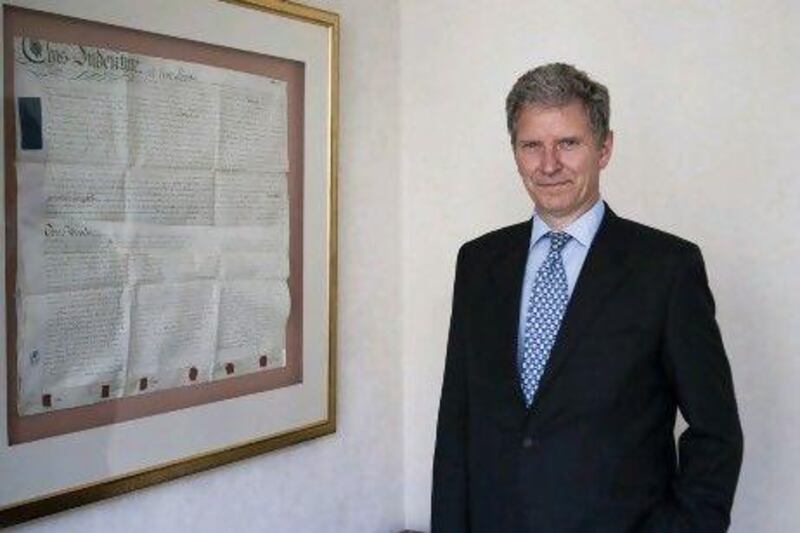After two years as head of Lloyds TSB's private banking business in the Middle East, Nigel Putt is heading off to Geneva to lead the ultra high net worth banking unit there.
Finance:
Industry Insights Exclusives you can bank on from The National's premium content. Learn More
Under Mr Putt in Dubai, the business - a part of the Lloyds Bank Group that emerged from the financial crisis of 2008 with the British government as a major shareholder - has continued to carve out a strong niche among expatriates in the region.
But there is increasing competition between the region's financial institutions to gain access to the lucrative individuals who make a private banking business successful. The financial crisis has thrown doubts on the traditional model of the investment bank, and several in the region are looking to wealth management to fill the gap left by collapsing brokerage and corporate business, especially in the Gulf.
At the same time, the Arab Spring has made for greater uncertainty in regional markets, and caused investors to wonder about the security of their assets in some parts of the Middle East. Mr Putt reflects on the lessons of his time in the Gulf.
q&a
q Lloyds TSB Private Banking has been in the region some time now. What are your overall thoughts on the Middle East?
a The countries within the region share a similar culture and set of values with one another, but as each country develops along its chosen path, there is also an expanding diversity. In the last three decades that Lloyds has been in the UAE we have been witness to a variety of political or economic development in and around the region. However, the factor that has been displayed most consistently over that time is a resilient focus on growth. Energy prices are clearly fundamental to the continuation of this but the average rate of reinvestment of this dividend into infrastructure is steadily increasing which can only be positive for the long term.
q Who is your core market in the UAE?
a Our clients are individuals and families who have strong links or associations with the UK, but come from many backgrounds, and who recognise our core values of fairness, ownership of our actions and simplicity in our delivery. In the Gulf, it reflects the multicultural aspect of life here, with Arabs, Asians and westerners all represented. The major families here have long-term memories; they've seen crashes and wars come and go, and they're part of the investment landscape. They tend not to panic.
q The global financial and investment scene is particularly volatile at this time. What is your assessment of how this is affecting investors in the Gulf?
a Many investors who originate from the region are very international in their outlook and therefore allocate their assets on a global basis. They often have businesses based on cross-border trade and so the vicissitudes of market cycles have a significant impact on both their short and long-term planning. Those who are prepared to be disciplined with their global asset allocation according to the individual objectives of each investment and to stick to those plans are often those who can take relative advantage of the opportunities that volatility can present. The Arab Spring has made the political landscape more unpredictable, but some parts, like the UAE for example, is benefiting from its status as a "safe haven". With problems in the US economy and the euro zone, Asia is looking much more positive. The economies there learnt from the 1990s, and the fundamentals are better now anyway. They have low levels of debt and high foreign reserves. But overall we need much better global cooperation to battle the threat of recession.
q What sectors and products does Lloyds believe offer best value for investors?
a "Best value" investments are difficult to determine on a general basis as they require the "best advice" to be identified, which is something that we provide specific to each client's bespoke requirements - furthermore, such recommendations also require hindsight to be validated as "best value". Nevertheless, time scales are important and in markets such as these "value" may well exist but might just as easily be hidden by sentiment.
q The private banking market in the region is becoming more competitive. What is it that distinguishes Lloyds TSB Private Banking from the rest?
a This is very clear to me. We are a buy-side, open-architecture advisory business which never seeks to over-promise. We are wary of over complicated and exotic strategies and focus only on our mandate of assisting the preservation of wealth from one generation to the next. Understanding and delivering on our client's unique requirements is at the heart of everything we do, and as we are not aligned to an investment bank we can focus on developing bespoke solutions rather than the creation of generic products.
q What is your personal investment philosophy?
a Never buy anything you don't understand. Never invest without a clear measurable objective. If you take risk, make sure you understand the reward you should expect and the assumptions that govern it. I would also add that inflation is at the core of investment. If you can understand that, you can get predict interest rates, and equity markets historically thrive in a climate of around 2.5 per cent.





